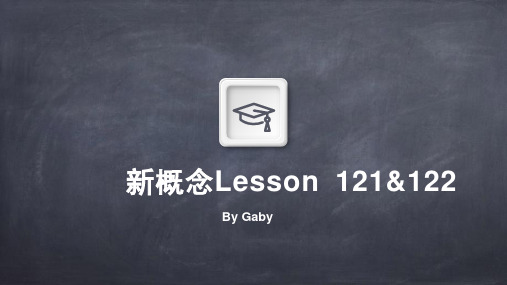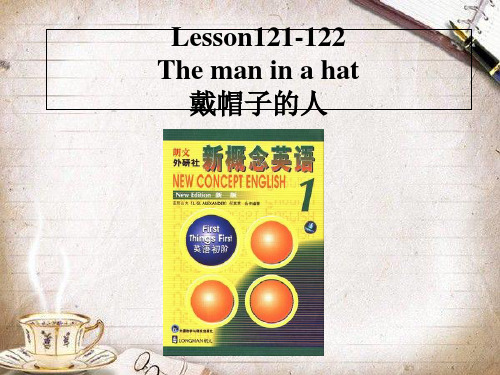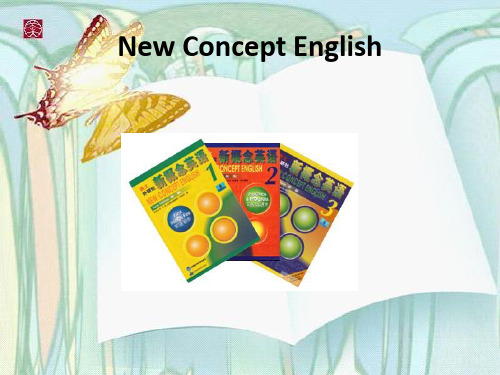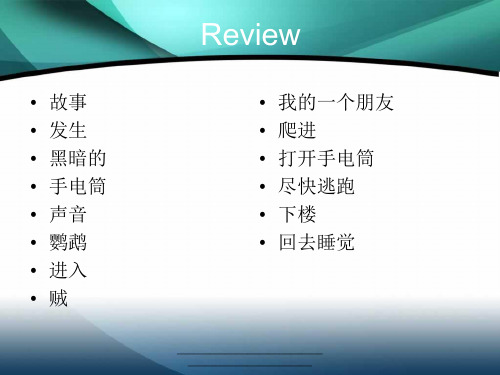新概念第一册121课件
合集下载
新概念英语NCE1_lesson121-122(共27页)课件

• CUSTOMER: I bought two expensive dictionaries here half and hour ago, but I forgot to take them with me.
• MANAGER: Who served you, sir? • CUSTOMER: The lady who is standing behind the counter. • MANAGER: Which books did you buy? • CUSTOMER: The books which are on the counter. • MANAGER: Did you serve this gentleman half an hour ago,
邮件还没发) • ②I forget sending an email to him.(忘记已经发过
了,邮件已经发出了)
• 3.serve :[sə:v] v. • (1)服务;接待;侍候:
• Are you being served, sir? • 先生,有人为您服务吗?
• A young waiter served them. • 一位年轻的侍者侍候他们进餐。 • (2)供给;摆出(食物或饮料等):
• 2.put it on,戴上它。
• 这里的 it指 a hat,以避免重复。 put on是“戴上”、“穿上”的意思。 假如它的宾语是一个名词,这个名词 可放在 put on之后,也可放在put和on 之间。假如是代词,就必须放在put和 on 之间。如:
• Put on your coat./Put your coat on. 穿 上外衣。但只能说:Put it on. 把它穿 上。
• What time is breakfast served in this hotel? • 这个饭店里什么时候供给早餐?
Lesson121-122(课件)新概念英语第一册

I recognize him now.
7. road [rəud] n.路 on the road 在路上 in the street 在大街上
1.The man in a hat (定语后置) in + 服装 ——穿着/ 戴着 in the white shirt - 穿着白衬衫 定语:“的” (修饰名词或者代词) a. 什么可以作定语:形容词: a pretty girl
1. customer ['kʌstəmə] n.顾客 sales assistant 销售员/ waiter 服务员 / waitress 女服务员 The customer is always right. 顾客至上
2. forget [fə'get] v.忘记 (forgot /fə'gɔt/, forgotten/fə'gɔtn/) forget to do sth 忘记要做...... e.g. I forget to finish my homework. (忘记做,还没做) forget doing sth 忘记已经做过...... e.g. I forget finishing my homework. (忘记已经做了,做过了。)
3. manager ['mænidʒə] n.经理 v. manage 管理 e.g. manage people 人事管理
4. serve [sə:v] v.照应,服务,接待 一位年轻的服务员侍候他们进餐。 A young waiter served them. n. service 服务 那家餐馆的服务很差。 The service in that restaurant is not good/bad/poor.
新概念Lesson 121&122
7. road [rəud] n.路 on the road 在路上 in the street 在大街上
1.The man in a hat (定语后置) in + 服装 ——穿着/ 戴着 in the white shirt - 穿着白衬衫 定语:“的” (修饰名词或者代词) a. 什么可以作定语:形容词: a pretty girl
1. customer ['kʌstəmə] n.顾客 sales assistant 销售员/ waiter 服务员 / waitress 女服务员 The customer is always right. 顾客至上
2. forget [fə'get] v.忘记 (forgot /fə'gɔt/, forgotten/fə'gɔtn/) forget to do sth 忘记要做...... e.g. I forget to finish my homework. (忘记做,还没做) forget doing sth 忘记已经做过...... e.g. I forget finishing my homework. (忘记已经做了,做过了。)
3. manager ['mænidʒə] n.经理 v. manage 管理 e.g. manage people 人事管理
4. serve [sə:v] v.照应,服务,接待 一位年轻的服务员侍候他们进餐。 A young waiter served them. n. service 服务 那家餐馆的服务很差。 The service in that restaurant is not good/bad/poor.
新概念Lesson 121&122
新概念一Lesson 121 (共22张PPT)-精品课件

A 1.The book___ I bought yesterday is lost.
A. that B. whose C. who D. whom
D 2. The river ___ is in front of my village is quite clean.
A. who B. what
C. /
口诀:
被修饰词是人, 从句缺主只用Who, 从句缺宾Who,Whom. 被修饰词是物, 要用Which来帮助, that是万金油.
用who whom which填空
1. Do you know the man who is smoking? 2. The building which is the tallest in our
server /'sə:və/ n.服务员 service /'sə:vɪs/ n.服务
counter /'kaʊntə/ n.柜台 count /kaʊnt/ . 数
recognize /'rekəɡnaɪz/ v.认出 know /nəʊ/ v.认识
road /rəʊd/ n.路(通车的大道 ) 谚语: All roads lead to Rome. 条条大道通罗马。 street /stri:t/ n.指城市中的街道或马路 way /weɪ/ n. 可表示各种各样的道路 也可指方法。
MANAGER: Have you got a hat, sir? CUSTOMER: Yes, I have. MANAGER: Would you put it on,
please? CUSTOMER: All right. MANAGER: Is this the man that you
新概念英语第一册第L121幻灯片课件

I felt very excited.
Lesson 121
Revision: Lesson119 A true story
❖ story
n.
❖ happen
v.
❖ thief
n.
❖ enter
v.
❖ dark
adj.Hale Waihona Puke ❖ torchn.
❖ voice
n.
❖ parrot
n.
❖ exercise book n.
( )10. --- Jimmy is leaving for a holiday. --- Really? Where _______ he _______? A. has; gone B. will; go C. did; go D. would; go
( )11. Frank _______ to see his grandma if he _______ free tomorrow.
( )2. --- How was your weekend on the farm?
--- Great! We _______ with the farmers.
A. enjoy ourselves B. went fishing
C. will work
D. make friends
( )3. --- What did Mr Jones do before he moved here? --- He _______ a city bus for over twenty-five years. A. is driving B. drove C. had driven D. drives
A. will come; will be B. comes; is
Lesson 121
Revision: Lesson119 A true story
❖ story
n.
❖ happen
v.
❖ thief
n.
❖ enter
v.
❖ dark
adj.Hale Waihona Puke ❖ torchn.
❖ voice
n.
❖ parrot
n.
❖ exercise book n.
( )10. --- Jimmy is leaving for a holiday. --- Really? Where _______ he _______? A. has; gone B. will; go C. did; go D. would; go
( )11. Frank _______ to see his grandma if he _______ free tomorrow.
( )2. --- How was your weekend on the farm?
--- Great! We _______ with the farmers.
A. enjoy ourselves B. went fishing
C. will work
D. make friends
( )3. --- What did Mr Jones do before he moved here? --- He _______ a city bus for over twenty-five years. A. is driving B. drove C. had driven D. drives
A. will come; will be B. comes; is
新概念英语NCE1_lesson121-122(共19页)课件

• customer n. 顾客(买东西的顾客) • client 银行,律师等的客户 • guest 旅馆的旅客 • passenger 乘客 • a regular customer 老顾客 • 顾客至上。
• The customer is always right.
• --forget v. • 1) 忘记 • 我忘了他的电话号码。
• recognize v. • 1) 认出 • 你能认出他的笔迹吗?
• Do you recognize his handwriting? • 2)承认(事实),认清,确认 • 我们都肯定她在舞蹈方面有才华。
ቤተ መጻሕፍቲ ባይዱ• We all recognized her talent for dancing.
• 他不承认自己犯下了大错。
• She forgot to mail the letter.
• 2) 忘记事 • --I forgot my umbrella. 我忘了带伞。 • 他将伞忘在火车上。 • He forgot his umbrella on the train, • = He left his umbrella on the train.
• Serve him right.= It serves him right!
• service n. • 那家餐馆的服务很差。
• The service in that restaurant is poor. • a charge for service 服务费
• counter n. 柜台 • 在珠宝部 • at the jewelry counter • 付帐柜台 • checkout counter
•9、阅读使人充实,会谈使人敏捷,写作与笔记使人精确……史鉴使人明智;诗歌使人巧慧2021/9/252021/9/25Saturday, September 25, 2021 •10、每一本书是一级小阶梯,我每爬上一级,就更脱离畜生而上升到人类,更接近美好生活的观念,更热爱书籍。2021/9/252021/9/252021/9/259/25/2021 8:48:32 PM •11、书是人类进步的阶梯,终生的伴侣,最诚挚的朋友。2021/9/252021/9/252021/9/25Sep-2125-Sep-21 •12、阅读一本不适合自己阅读的书,比不阅读还要坏。我们必须会这样一种本领,选择最有价值、最适合自己所需要的读物。2021/9/252021/9/252021/9/25Saturday, September 25, 2021 13、He who seize the right moment, is the right man.谁把握机遇,谁就心想事成。2021/9/252021/9/252021/9/252021/9/259/25/2021 •14、谁要是自己还没有发展培养和教育好,他就不能发展培养和教育别人。2021年9月25日星期六2021/9/252021/9/252021/9/25 •15、一个爱书的人,他必定不致缺少一个忠实的朋友,一个良好的老师,一个可爱的伴侣,一个优婉的安慰者。2021年9月2021/9/252021/9/252021/9/259/25/2021 •16、提出一个问题往往比解决一个更重要。因为解决问题也许仅是一个数学上或实验上的技能而已,而提出新的问题,却需要有创造性的想像力,而且标志着科学的真正进步。 2021/9/252021/9/25September 25, 2021 •17、看文字须大段精彩看,耸起精神,竖起筋骨,不要困,如有刀剑在后一般。就一段中须要透;击其首则尾应,击其尾则首应,方始是。不可按册子便在,掩了册子便忘。 2021/9/252021/9/252021/9/252021/9/25
Lesson121(课件)新概念英语第一册

Exercises before class:把下列句子合并成一个句子。
• 1. This is the girl. The girl served me.
• 2. This is the book. I bought the book.
Exercises before class:把下列句子合并成一个句子。
• 6. 带着一顶帽子
• 7. put it on
• 7. 把它带上
• 8. all right
• 8. 好吧
• 9. recognize him
• 9. 认出他
Phrases:
• 1. The lady who is standing behind the counter. • 2. The books which are on the counter. • 3. He says that he's the man who bought these books. • 4. The man who I served was wearing a hat. • 5. Is this the man that you served?
• 2. half an hour ago
• 2. 半个小时以前
• 3. forget to do
• 3. 忘记做பைடு நூலகம்事
• 4. take sth. with sb.
• 4. 某人随身携带
• 5. stand behind the counter • 5. 站在柜台的后面
• 6. wear a hat
but I f_o_r_g_o(tftoorgtaekt)ettohteamkewtihthemme. with me.
• 1. This is the girl. The girl served me.
• 2. This is the book. I bought the book.
Exercises before class:把下列句子合并成一个句子。
• 6. 带着一顶帽子
• 7. put it on
• 7. 把它带上
• 8. all right
• 8. 好吧
• 9. recognize him
• 9. 认出他
Phrases:
• 1. The lady who is standing behind the counter. • 2. The books which are on the counter. • 3. He says that he's the man who bought these books. • 4. The man who I served was wearing a hat. • 5. Is this the man that you served?
• 2. half an hour ago
• 2. 半个小时以前
• 3. forget to do
• 3. 忘记做பைடு நூலகம்事
• 4. take sth. with sb.
• 4. 某人随身携带
• 5. stand behind the counter • 5. 站在柜台的后面
• 6. wear a hat
but I f_o_r_g_o(tftoorgtaekt)ettohteamkewtihthemme. with me.
最新新概念一册第121课件

• 失去父母的孩子叫做孤儿。 • 我想要一个有大窗户的房间。 • I’d like a room whose window is big. • 用铅笔写的信很难读 • A letter that is written in pencil is difficult to read.
• recognize v. • 1) 认出 • 你能认出他的笔迹吗? • Do you recognize his handwriting? • 2)承认(事实),认清,确认 • 我们都肯定她在舞蹈方面有才华。 • We all recognized her talent for dancing. • 他不承认自己犯下了大错。 • He didn’t recognize that he had made a big
___________________________ _______________________
• 2) 忘记事 • --I forgot my umbrella. 我忘了带伞。 • 他将伞忘在火车上。 • He forgot his umbrella on the train, • = He left his umbrella on the train.
n. 经理 v. 照应,服务,接待 n. 柜台
v. 认出
___________________________ _______________________
• customer n. 顾客(买东西的顾客) • client 银行,律师等的客户 • guest 旅馆的旅客 • passenger 乘客 • a regular customer 老顾客 • 顾客至上。 • The customer is always right.
mistake.
• recognize v. • 1) 认出 • 你能认出他的笔迹吗? • Do you recognize his handwriting? • 2)承认(事实),认清,确认 • 我们都肯定她在舞蹈方面有才华。 • We all recognized her talent for dancing. • 他不承认自己犯下了大错。 • He didn’t recognize that he had made a big
___________________________ _______________________
• 2) 忘记事 • --I forgot my umbrella. 我忘了带伞。 • 他将伞忘在火车上。 • He forgot his umbrella on the train, • = He left his umbrella on the train.
n. 经理 v. 照应,服务,接待 n. 柜台
v. 认出
___________________________ _______________________
• customer n. 顾客(买东西的顾客) • client 银行,律师等的客户 • guest 旅馆的旅客 • passenger 乘客 • a regular customer 老顾客 • 顾客至上。 • The customer is always right.
mistake.
新概念英语NCE1_lesson121-122(共51页)课件

The man we met is my uncle.
④(先行词)物 + which/that + 动词(作主语)
which是指人以外的生命或没有生命的东西
This is the bird which always sings at night.
⑤(先行词)物+which/that + 主语 + 及物动词(作宾语)
③ 如果关系代词在从句中作介词的宾语,且介词提前了, 介词后的关系代词只能加whom(人)/which(物),不能用that。 That’s the man I told you about.
Question
Why didn't Caroline recognize the customer straight away?
recognize
① v. 认出;认识
Can you recognize the person?
② v. 承认;确认
I recognize that he is more capable than I am.
serve
① v. 服务;接待;侍候
Are you being served, sir?
He is offered a job in Canada.
② v. 提出;出(价)
Do you have any good suggestions to offer?
③ v.(主动)表示愿意,提议
He offered to help me.
grow (grew/grown)
① v. 生长;成长
Lesson 121 The man in a hat forget v. 忘记
forget to do sth. I have forgotten to bring my book. forget doing sth. I will never forget finding that book in my garden.
④(先行词)物 + which/that + 动词(作主语)
which是指人以外的生命或没有生命的东西
This is the bird which always sings at night.
⑤(先行词)物+which/that + 主语 + 及物动词(作宾语)
③ 如果关系代词在从句中作介词的宾语,且介词提前了, 介词后的关系代词只能加whom(人)/which(物),不能用that。 That’s the man I told you about.
Question
Why didn't Caroline recognize the customer straight away?
recognize
① v. 认出;认识
Can you recognize the person?
② v. 承认;确认
I recognize that he is more capable than I am.
serve
① v. 服务;接待;侍候
Are you being served, sir?
He is offered a job in Canada.
② v. 提出;出(价)
Do you have any good suggestions to offer?
③ v.(主动)表示愿意,提议
He offered to help me.
grow (grew/grown)
① v. 生长;成长
Lesson 121 The man in a hat forget v. 忘记
forget to do sth. I have forgotten to bring my book. forget doing sth. I will never forget finding that book in my garden.
- 1、下载文档前请自行甄别文档内容的完整性,平台不提供额外的编辑、内容补充、找答案等附加服务。
- 2、"仅部分预览"的文档,不可在线预览部分如存在完整性等问题,可反馈申请退款(可完整预览的文档不适用该条件!)。
- 3、如文档侵犯您的权益,请联系客服反馈,我们会尽快为您处理(人工客服工作时间:9:00-18:30)。
Grammar
定语从句(The Attributive Clause)
as, that 必须以that引导的定语从句的用法
1) 当先行词是 anything, everything等不定代词时 Is there anything in this book that is worth reading?
serve sb right (口语)给某人应得的报应 (惩罚)
e.g. Serve him right. = It serves him right!
(他活该)罪有应得!
serve
v.
照应,
服务,接待
seve
service
n.
e.g.The service in that restaueant is poor. 那家餐馆的服务很差。
即可指人也可指物,在从句中做定语。 Miss Li is the teacher whose house caught fire last year
This is the boy whose mother is our Chinese teacher.
The house whose roof is damaged has now been repaired.
e.g. He forgot his unbrella on the train. 他将伞遗忘在火车上。
e.g. he left his umbrella on the train.
manager
n. 经理
a sales manager 销售经理
manager manage a firm
v. 管理 经营公司
That was the reason why she had changed that much.
Grammar
定语从句(The Attributive Clause)
非限制性定语从句 ( Non-restrictive Attributive Clause )
与主句关系并不十分密切,它仅是对先行词 做补充说明的作用,如果被省去,主句的意 思仍然是完整清楚的,这种定语从句与主句 之间常常要用逗号来分开。
先行词:被定语从句修饰的词称为先行词。从句必须 ---------置于先行词之后。
引导词:引导从句的词,也称关联词。
This is the reason that he didn't come to the meeting.
•
先行词 引导词
定语从句
Grammar
定语从句(The Attributive Clause)
2)承认(事实),认清,确认
e.g. We all recognized her talent for dancing. 我们都承认他在舞蹈方面有才华。
e.g. He didn't recognize that he had made a big mistake. 他不承认自己犯下了大错。
定语:用来修饰、限定、说明名词(或代词)的特征的。
Abraham Lincoln, who led the United States through these years, was shot on April 14,1865 at a theatre in Washington D.C.
➢先行词antecedent :专有名词,独一无二的人或事物
表示时间,在定语从句中做时间状语。 先行词往往都是表示时间的名词。time,hour,day, year, afternoon...
I still remember the day when I first came to Beijing.
I will never forget the time when we worked on the farm.
The lady to whom you talked is a famous singer.
The village that she lives in is 20 kilometers away.
Grammar
定语从句(The Attributive Clause)
限制性定语从句 (由关系代词引导的) 4. 关系代词 that, whom, which
Is this the watch which he is looking for? The babies whom the nurses are looking after are very healthy.
Grammar
定语从句(The Attributive Clause)
限制性定语从句 (由关系副词引导的) 1. when
The factory where his father worked is in the west of the city.
Grammar
定语从句(The Attributive Clause)
限制性定语从句 (由关系副词引导的) 3. why
表示原因,在定语从句中做原因状语。 先行词只有表示原因的reason一词。
manager
v. 设法(成功)做到,处理
e.g. A: Can I help with your luggage? 我能帮你拿行李吗?
B: No,thanks.I can manage it. 不,谢谢。我能行。
serve
v. 照应, 服务,接待
e.g. How can we serve you? (营业员对顾客用语)需要我们为您服务吗?
Grammar
定语从句(The Attributive Clause)
限制性定语从句 (由关系代词引导的) 3. that
即可指人也可指物。可做主语,宾语。 A plane is a machine that can fly.
Who is the man that is reading the book over there?
引导定语从句的关系代词 who,whom,whose,that, which
引导定语从句的关系副词 when,where,why,as
Grammar
定语从句(The Attributive Clause)
限制性定语从句 ( restrictive Attributive Clause )
是先行词在意义上不可缺少的一个定 语,主从句之间关系密切,书写时绝 对不可以用逗号分开。
a girl in red 介词短语作定语
定语
a boy standing in the platform 分词短语作定语
a boy who is standing in the platform is Tom 句子作定语
定语从句
定语从句:在复合句中修饰名词(人或物)
--
----------和代词的从句。
非限制性定语从句可用除that以外的其他关系代词来引导。
Grammar
定语从句(The Attributive Clause)
非限制性定语从句
Yesterday I met Peter, who seemed to be very busy. In Britain, which has a population of 55.8 million people,110 thousand people die from smoking each year.
Grammar
定语从句(The Attributive Clause)
限制性定语从句 (由关系副词引导的) 2. where
表示地点,在定语从句中做地点状语。 先行词往往是表示地点的名词,如place, house等。
This is the house where we lived last year.
e.g. Don't forget to go to the forest cabin and let it all hang out on holidays.
别忘了在假日去森林小木屋完全放松一下。
forget v.
2)忘记带 (买、做)
e.g. I forgot my umbrella. 我忘了带伞。
Lesson121
The man in a东西的顾客)
client guest passenger
银行,律师等的客户 旅馆的旅客 乘客
a regular customer 老顾客
e.g. The customer is always right. 顾客至上。
forget
在定语从句中做介词宾语时有下面几种情况
➢ 关系代词whom,that,which在限制性定语从句中做动词宾语时常常可以 省略。
The man (that) I saw yesterday is Tom's father.
Grammar
定语从句(The Attributive Clause)
限制性定语从句 (由关系代词引导的) 5. 含有介词的短语动词一般都不可以拆开,介词仍放在动词后面。
a charge for service 服务费
ccoouunntteerr
n.
1) 柜台 at the jewelry counter 在珠宝柜台 checkout counter 付账柜台 2)柜台式长桌 lunch counter 柜台式长餐桌 3)计算器
recognize
v.
1)认出
e.g. Do you recognize my handwriting? 你能认出我的笔迹吗?
The fish which we bought were not fresh.
Grammar
定语从句(The Attributive Clause)
限制性定语从句 (由关系代词引导的) 5. 关系代词 that, whom, which 在定语从句中做介词宾语时 有下面几种情况:
